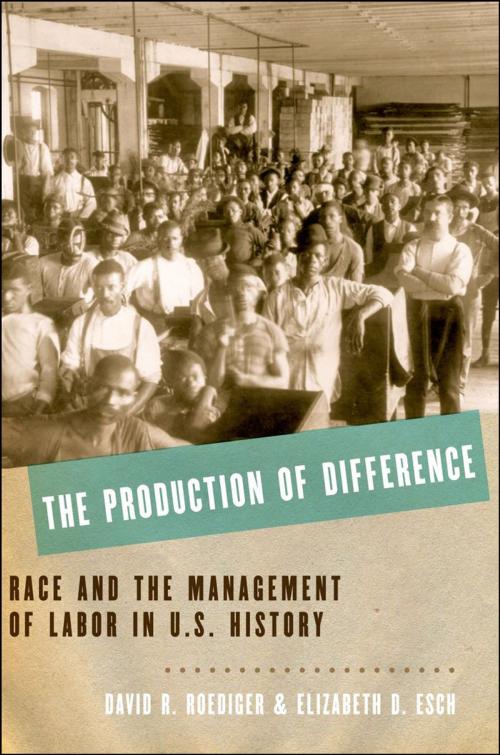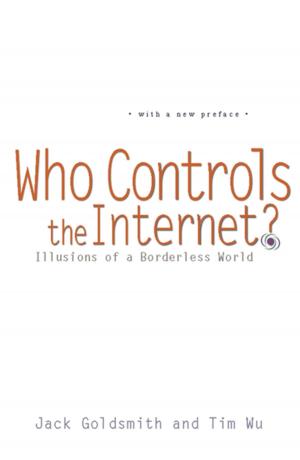The Production of Difference
Race and the Management of Labor in U.S. History
Nonfiction, History, Americas, United States, 19th Century, 20th Century| Author: | David R. Roediger, Elizabeth D. Esch | ISBN: | 9780199912612 |
| Publisher: | Oxford University Press | Publication: | June 1, 2012 |
| Imprint: | Oxford University Press | Language: | English |
| Author: | David R. Roediger, Elizabeth D. Esch |
| ISBN: | 9780199912612 |
| Publisher: | Oxford University Press |
| Publication: | June 1, 2012 |
| Imprint: | Oxford University Press |
| Language: | English |
In 1907, pioneering labor historian and economist John Commons argued that U.S. management had shown just one "symptom of originality," namely "playing one race against the other." In this eye-opening book, David Roediger and Elizabeth Esch offer a radically new way of understanding the history of management in the United States, placing race, migration, and empire at the center of what has sometimes been narrowly seen as a search for efficiency and economy. Ranging from the antebellum period to the coming of the Great Depression, the book examines the extensive literature slave masters produced on how to manage and "develop" slaves; explores what was perhaps the greatest managerial feat in U.S. history, the building of the transcontinental railroad, which pitted Chinese and Irish work gangs against each other; and concludes by looking at how these strategies survive today in the management of hard, low-paying, dangerous jobs in agriculture, military support, and meatpacking. Roediger and Esch convey what slaves, immigrants, and all working people were up against as the objects of managerial control. Managers explicitly ranked racial groups, both in terms of which labor they were best suited for and their relative value compared to others. The authors show how whites relied on such alleged racial knowledge to manage and believed that the "lesser races" could only benefit from their tutelage. These views wove together managerial strategies and white supremacy not only ideologically but practically, every day at workplaces. Even in factories governed by scientific management, the impulse to play races against each other, and to slot workers into jobs categorized by race, constituted powerful management tools used to enforce discipline, lower wages, keep workers on dangerous jobs, and undermine solidarity. Painstakingly researched and brilliantly argued, The Production of Difference will revolutionize the history of labor race in the United States.
In 1907, pioneering labor historian and economist John Commons argued that U.S. management had shown just one "symptom of originality," namely "playing one race against the other." In this eye-opening book, David Roediger and Elizabeth Esch offer a radically new way of understanding the history of management in the United States, placing race, migration, and empire at the center of what has sometimes been narrowly seen as a search for efficiency and economy. Ranging from the antebellum period to the coming of the Great Depression, the book examines the extensive literature slave masters produced on how to manage and "develop" slaves; explores what was perhaps the greatest managerial feat in U.S. history, the building of the transcontinental railroad, which pitted Chinese and Irish work gangs against each other; and concludes by looking at how these strategies survive today in the management of hard, low-paying, dangerous jobs in agriculture, military support, and meatpacking. Roediger and Esch convey what slaves, immigrants, and all working people were up against as the objects of managerial control. Managers explicitly ranked racial groups, both in terms of which labor they were best suited for and their relative value compared to others. The authors show how whites relied on such alleged racial knowledge to manage and believed that the "lesser races" could only benefit from their tutelage. These views wove together managerial strategies and white supremacy not only ideologically but practically, every day at workplaces. Even in factories governed by scientific management, the impulse to play races against each other, and to slot workers into jobs categorized by race, constituted powerful management tools used to enforce discipline, lower wages, keep workers on dangerous jobs, and undermine solidarity. Painstakingly researched and brilliantly argued, The Production of Difference will revolutionize the history of labor race in the United States.















